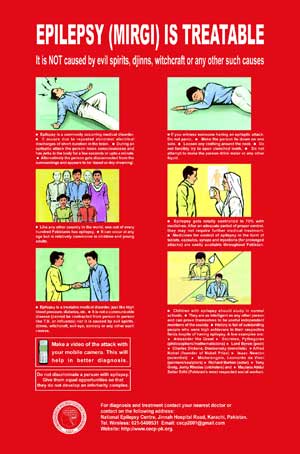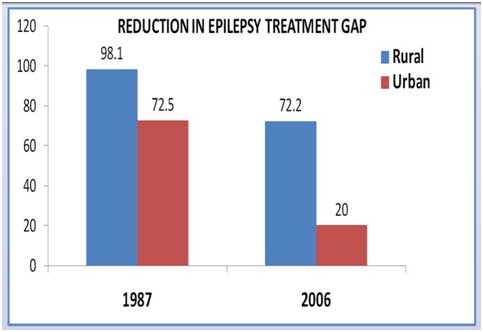Chapter Spotlight: Pakistan
Epilepsy Association of Pakistan focuses towards creating epilepsy awareness among the masses and toward providing quality ‘holistic’ treatment to patients with epilepsy. A majority of the members of the Association are part of the Comprehensive Epilepsy Programme of Pakistan (CECP) and hence the goals are mainly achieved through activities of CECP.
Public Awareness about Epilepsy

In Pakistan, public awareness campaign for epilepsy is ongoing since about three decades; being intensive and sustained since 2001. Various projects have been undertaken and newer are being in-cooperated to achieve the main objective of changing the nation's mind-set towards epilepsy - the disorder and people with epilepsy (PWE). It also focuses on decreasing the stigma associated with epilepsy and reducing the treatment gap.
Epilepsy awareness is being done using a short slogan, “Epilepsy is treatable. It is not due to djinns, witchcraft, evil eye or other supernatural forces. Contact your doctor for advice." This slogan is being used for all awareness activities done through electronic and print media, free epilepsy camps in remote areas of the country, banners, billboards, graffiti, awareness posters in main public places, school awareness programs for school teachers and secondary school students, awareness publications, awareness stickers on fleet of ambulances and inter-city cargo transports and all other possible means.
Since 2012, the main focus has been on epilepsy awareness via electronic media. An epilepsy awareness documentary has been produced to educate the masses about the nature of the disorder, its treatability and reiterating the fact that majority of PWE are "normal" human beings. Abdul Sattar Edhi, a social worker of international repute who is known to every Pakistani (he is at par with Mother Teresa but with a difference: his humanitarian services for more than 60 years are diverse and of greater quantum) and Ms. Kamley talk about their epilepsy and how it has not affected their lives. This is a definite morale booster for the epilepsy patients and their caretakers. All information is conveyed through a collection of bulleted messages to keep the duration brief (5 minutes) in view of the limited attention span of an average TV viewer (with ~100 channels, they keep on surfing) and to reduce the telecast costs.
This documentary has been produced with narration in the national language Urdu, regional languages Sindhi, Pushto, and Balochi, and also in English. Paid telecasts on popular satellite television channels in the national and regional languages are being done. The documentary is being telecast twice a day for three months on each channel. To date the documentary has been aired on four regional channels in the four provincial languages and doing a second round. This documentary has also been exhibited at the ILAE congress booths.
Patient management
Epilepsy management is provided by various neurology departments of public and private hospitals in the country. Holistic patient management at the country’s only epilepsy designated, NGO-run National Epilepsy Centre (NEC), in Karachi continues where patients are supplied monthly medicine at a token cost (~2% of the actual cost; the remaining being borne by a philanthropic family) and EEG done at highly subsidized rates. The radiology department of the public sector hospital where it is located provides the facility with MRI and CT at subsidized rates. All specialists at NEC extend voluntary services and ensure strict compliance. On 30 June 2015 the number of registered patients was 7,200.
Educational Activities
Epilepsy workshops on patient management are being held throughout the country to train primary care physicians in epilepsy management.
Interactive training programs for primary care physicians, lady health workers, and medical students have been done and we plan to continue this activity.
Reducing the treatment gap
The 1987 population-based epidemiologic study revealed prevalence of epilepsy in Pakistan to be 0.98%. The epilepsy treatment gap in the rural population was 98.1% and 72.5% in the urban, the main reasons being lack of knowledge and wrong cultural beliefs. In 2006, a second population-based study was conducted to gauge the response of the country-wide epilepsy awareness campaign which continues to date. The treatment gap noted was 72.2% in rural and 20% in the urban population. With all other variables remaining constant, an intensive and sustained epilepsy awareness campaign has been instrumental in a significant decrease in epilepsy treatment gap.

Chapter Executives
Prof. Shaukat Ali, Past President
Prof. Hasan Aziz, Founder President
Dr. Zarine Mogal, General Secretary
Email: zarine_mogal@yahoo.com
Subscribe to the ILAE Newsletter
To subscribe, please click on the button below.
Please send me information about ILAE activities and other
information of interest to the epilepsy community

